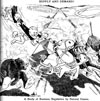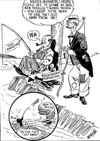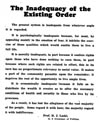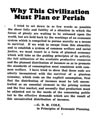by
Archivist, Brandon University
Introduction
Language. Politics. Face to face. Figures from a democratic polity in which all political language—all populisms—descend from the headwaters of liberal theory and its affirmations and refutations—its dialogic relationships. One recalls Bakhtin's words: "The speaker is not the Biblical Adam, dealing only with virgin and still unnamed objects, giving them names for the first time."
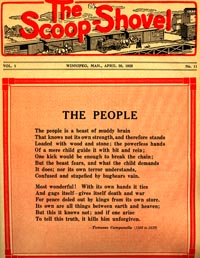 Various populisms echo through the languages of agrarian reform—agrarian critiques of free market capitalism and liberal electoral politics—in western Canada. They date from the earliest years of western settlement when Grangers, Patrons, American populists, cooperators, single taxers, and Social Gospellers—among others—critiqued free market capitalism and Canada's democratic polity as fraudulent shams designed to entrap and exploit the farmer.
Various populisms echo through the languages of agrarian reform—agrarian critiques of free market capitalism and liberal electoral politics—in western Canada. They date from the earliest years of western settlement when Grangers, Patrons, American populists, cooperators, single taxers, and Social Gospellers—among others—critiqued free market capitalism and Canada's democratic polity as fraudulent shams designed to entrap and exploit the farmer.
Western Canadian agrarians dismissed Adam Smith's "invisible hand" as bunk. Claims from the defenders of capitalism that the unfettered market would distribute goods, services, labour and profit equitably and ensure the smooth operation of enterprise were bogus. Such accounts only camouflaged the machinations of speculators and fixers and promoted the organized exploitation of the farmer by big interests—mostly in eastern Canada. For agrarian populists a fight for economic justice had to be mounted against the apologists of the free market and their kept politicians. New economic strategies and new political instruments were required to combat the oppression of the farm community. The first order of the day was to fight the propaganda of the interests, to counter the "eyewash", "bunk" and "deception" designed to keep farmers in thrall.
Direct action in the market place through farmer-controlled cooperatives was also required. And agrarian reformers transformed the western economy with cooperative institutions. In place of the ideals of competitive capitalism, primary producers, men and women, substituted the principle of cooperation. And cooperative institutions: cooperative marketing of wheat through a producer controlled wheat pool and cooperatively owned elevators. And they created a host of other cooperatives: some to acquire basic commodities for the farm; others to market everything from honey to dairy products. But it was a hard struggle, a struggle that required the education of the oppressed farmer—man and woman—who too often fell victim to the propaganda of the interests.
The technology that Manitoba cooperators forged for this purpose was The Scoop Shovel, later to become the Manitoba Cooperator. The pages of The Scoop Shovel record the struggle of farm cooperators to bring to bear the principle of cooperation on agrarian economic problems and to illuminate the central importance of the cooperative principle to human affairs locally and internationally.
It is in the cartoons that appeared in The Scoop Shovel—the majority authored by Edgar S. Russenholt—that the message of agrarian populism rooted in the cooperative principle is conveyed most emphatically. In the cartoons below, from the pages of The Scoop Shovel, the campaign for cooperative marketing of grain and the struggle against the vested interests—in particular the machinations of the Winnipeg Grain Exchange—give way to a critique of unfettered capitalism as the root of the Great Depression. Here The Scoop Shovel invokes the discourses of Keynes, Cole and Laski to drive home the lesson that the world's misery was a product of unregulated capitalism, a system that had proven itself morally and pragmatically bankrupt, unredeemable as the basis for a humane social order. The struggle for social and economic justice—one that continues to be waged—was at the heart of the agrarian movement.
Political cartoons from:
The Scoop Shovel,
7 v. : ill. ; 30 cm
Monthly.
Winnipeg : Manitoba Wheat Pool, 1924-1931.
Official organ of Manitoba Co-operative Dairies, Manitoba Egg and Poultry Pool, Manitoba Co-operative Livestock Producers, Manitoba Cooperative Wholesale.
Manitoba Pool Elevator fonds
S.J. McKee Archives
Brandon University
About Ecclectica | Current issue | Issue archive | Links | The editorial team | Contact us
ISSN 1708-721X










